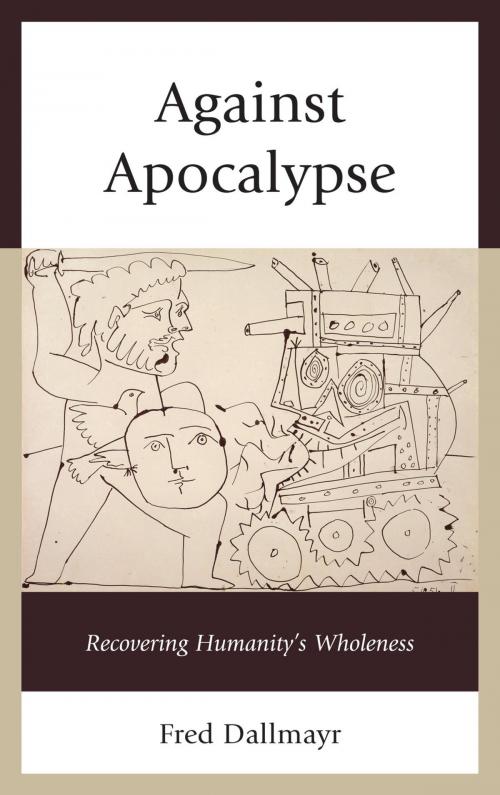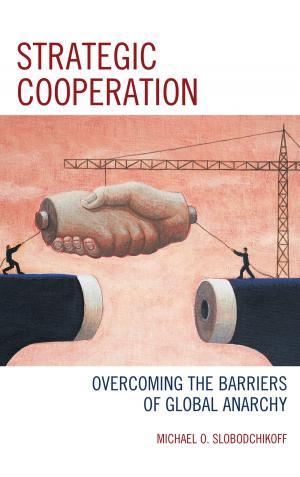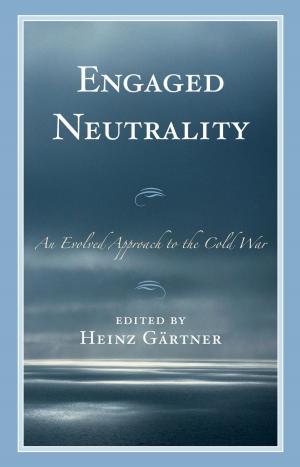Against Apocalypse
Recovering Humanity's Wholeness
Nonfiction, Religion & Spirituality, Philosophy, Political| Author: | Fred Dallmayr | ISBN: | 9781498524452 |
| Publisher: | Lexington Books | Publication: | December 24, 2015 |
| Imprint: | Lexington Books | Language: | English |
| Author: | Fred Dallmayr |
| ISBN: | 9781498524452 |
| Publisher: | Lexington Books |
| Publication: | December 24, 2015 |
| Imprint: | Lexington Books |
| Language: | English |
The book denounces the irresponsible recklessness of some geopolitical agendas which are pushing the world relentlessly toward a major global war, and possibly toward nuclear destruction or apocalypse. The Bulletin of Atomic Scientists has recently placed the "Doomsday Clock" at three minutes to midnight. Signs pointing toward a possible grand disaster are multiple: everywhere one looks in our world today one finds ethnic and religious conflicts, bloody mayhem, incipient genocide, proxy wars and "hybrid" wars", renewal of the Cold War. Add to these ills global economic crises, massive streams of refugees, and the threats posed by global warming - and the picture of a world in complete disorder is complete. Thus, it is high time for humankind to wake up. Starting from the portrayal of global "anomie", the book issues a call to people everywhere to oppose the rush to destruction and to return to political sanity and the quest for peace. This is a call to global public responsibility. In ethical terms, it says that people everywhere have an obligation to prevent apocalypse and to "maintain" our world or "hold the world together" in all its dimensions - including the dimensions of human and social life, natural ecology, and human spiritual aspirations (or openness to the divine). Differently out: in lieu of the prevailing disorder and brokenness, the book urges us to search for a new "wholeness" and just peace.
The book is intercultural and also inter-disciplinary. Since the aim is holistic - to hold the world together - the book necessarily has to draw on many disciplines: including philosophy, theology, social science, history, and literature. In terms of Western philosophical and intellectual legacies, it draws mainly on the teachings of Nietzsche, Heidegger, and Derrida. It also offers a completely new interpretation of the work of Thomas Hobbes, unearthing in this work an ethical demand to exit from the state of perpetual warfare in the direction of a shared commonwealth. The text also relies on the teachings of Christian theology (both Catholic and Protestant), invoking at crucial junctures the works of Karl Barth, Raimon Panikkar, and others. In terms of non-Western intellectual and spiritual legacies, the book offers new interpretations of leading texts in the Indian and Chinese traditions. Thus, emphasis is placed on the ideas of "world maintenance" (loka-samgraha) in Hinduism and of "All-Under-Heaven" in classical Chinese thought. Although a central thrust of the text is for a new wholeness, the goal is not a uniform synthesis where everything would be swallowed up in a bland unity. Rather the issue is how to preserve diversity of the world in its rightful integrity, by linking all elements in a complex web of interconnections and "relationality".
The book denounces the irresponsible recklessness of some geopolitical agendas which are pushing the world relentlessly toward a major global war, and possibly toward nuclear destruction or apocalypse. The Bulletin of Atomic Scientists has recently placed the "Doomsday Clock" at three minutes to midnight. Signs pointing toward a possible grand disaster are multiple: everywhere one looks in our world today one finds ethnic and religious conflicts, bloody mayhem, incipient genocide, proxy wars and "hybrid" wars", renewal of the Cold War. Add to these ills global economic crises, massive streams of refugees, and the threats posed by global warming - and the picture of a world in complete disorder is complete. Thus, it is high time for humankind to wake up. Starting from the portrayal of global "anomie", the book issues a call to people everywhere to oppose the rush to destruction and to return to political sanity and the quest for peace. This is a call to global public responsibility. In ethical terms, it says that people everywhere have an obligation to prevent apocalypse and to "maintain" our world or "hold the world together" in all its dimensions - including the dimensions of human and social life, natural ecology, and human spiritual aspirations (or openness to the divine). Differently out: in lieu of the prevailing disorder and brokenness, the book urges us to search for a new "wholeness" and just peace.
The book is intercultural and also inter-disciplinary. Since the aim is holistic - to hold the world together - the book necessarily has to draw on many disciplines: including philosophy, theology, social science, history, and literature. In terms of Western philosophical and intellectual legacies, it draws mainly on the teachings of Nietzsche, Heidegger, and Derrida. It also offers a completely new interpretation of the work of Thomas Hobbes, unearthing in this work an ethical demand to exit from the state of perpetual warfare in the direction of a shared commonwealth. The text also relies on the teachings of Christian theology (both Catholic and Protestant), invoking at crucial junctures the works of Karl Barth, Raimon Panikkar, and others. In terms of non-Western intellectual and spiritual legacies, the book offers new interpretations of leading texts in the Indian and Chinese traditions. Thus, emphasis is placed on the ideas of "world maintenance" (loka-samgraha) in Hinduism and of "All-Under-Heaven" in classical Chinese thought. Although a central thrust of the text is for a new wholeness, the goal is not a uniform synthesis where everything would be swallowed up in a bland unity. Rather the issue is how to preserve diversity of the world in its rightful integrity, by linking all elements in a complex web of interconnections and "relationality".















